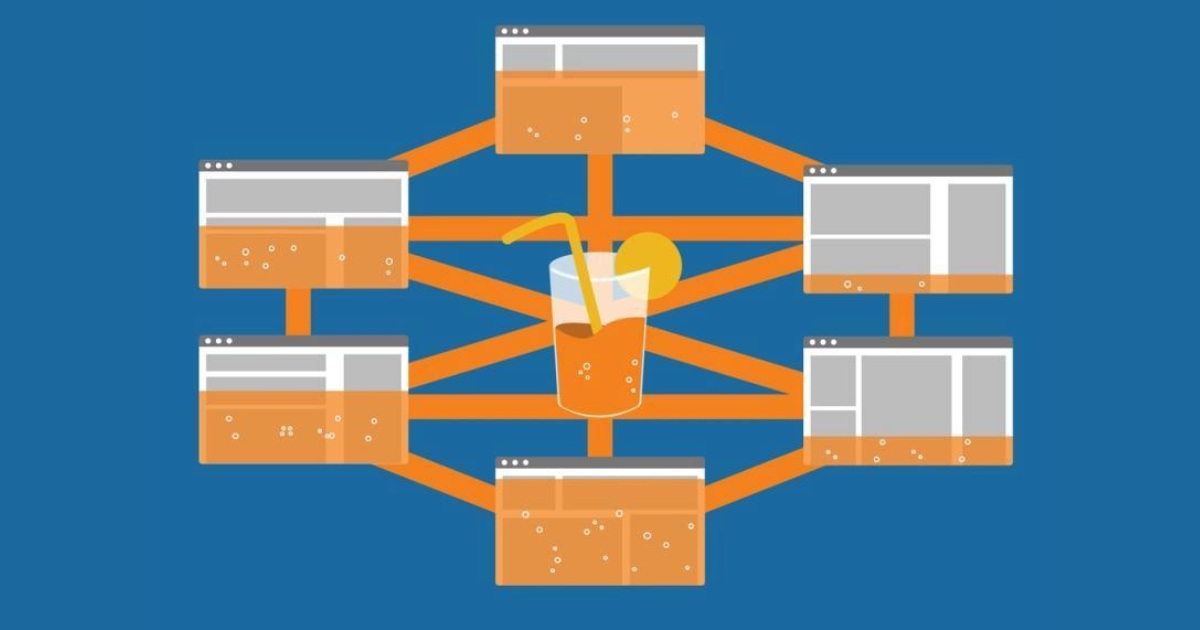Link juice is an important concept in search engine optimization (SEO) that plays a significant role in determining a website’s ranking in search engine results pages (SERPs). For SaaS businesses, understanding and using link juice can make a substantial difference in driving organic traffic and attracting potential customers
What is Link Juice?
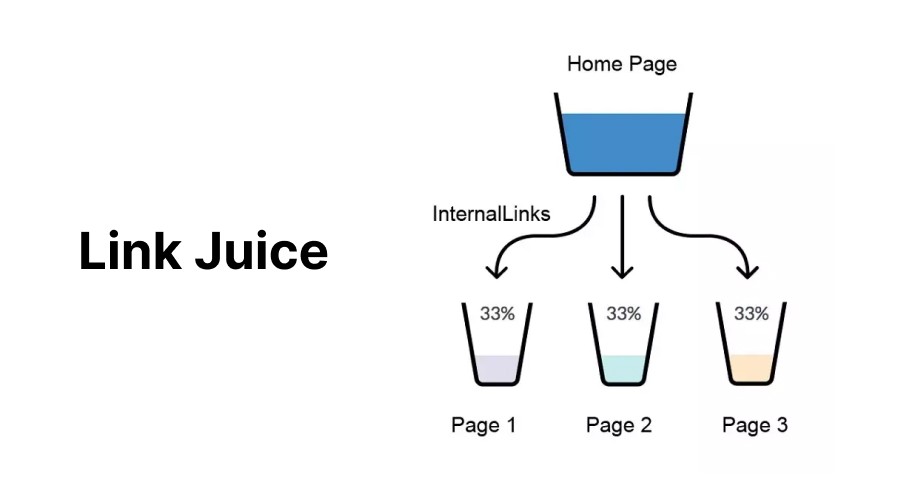
Link juice, also known as link equity, refers to the value or authority passed from one web page to another through hyperlinks. When a webpage links to another, it essentially votes for the linked page’s relevance and importance, passing along some of its authority
How is Link Juice Determined?
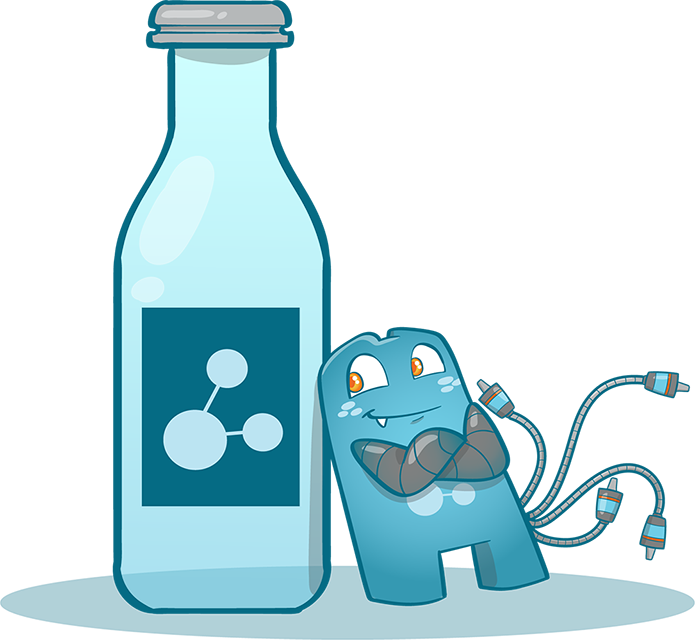
Several factors influence the amount of link juice a webpage receives:
- The Authority of the Page the Link is From: Links from high-authority websites carry more weight and pass more link juice than those from low-authority sites.
- The Type of Link: Dofollow links pass link juice, while nofollow links do not. However, a natural mix of both is important for a healthy backlink profile.
- The Page’s Content: Links from relevant, high-quality content are more valuable than those from irrelevant or low-quality pages.
The Importance of Link Juice in SEO
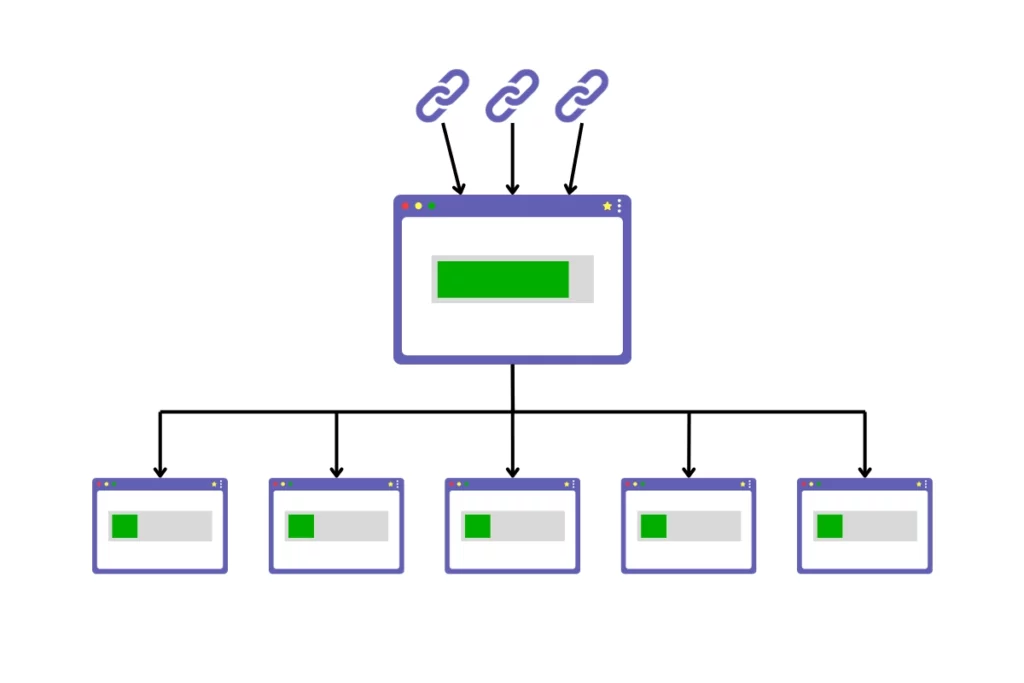
Link juice is a key factor in SEO because search engines like Google use links to discover new webpages and determine their relevance and authority. Pages with more link juice tend to rank higher in search results, driving more organic traffic.
How Does Link Juice Work?
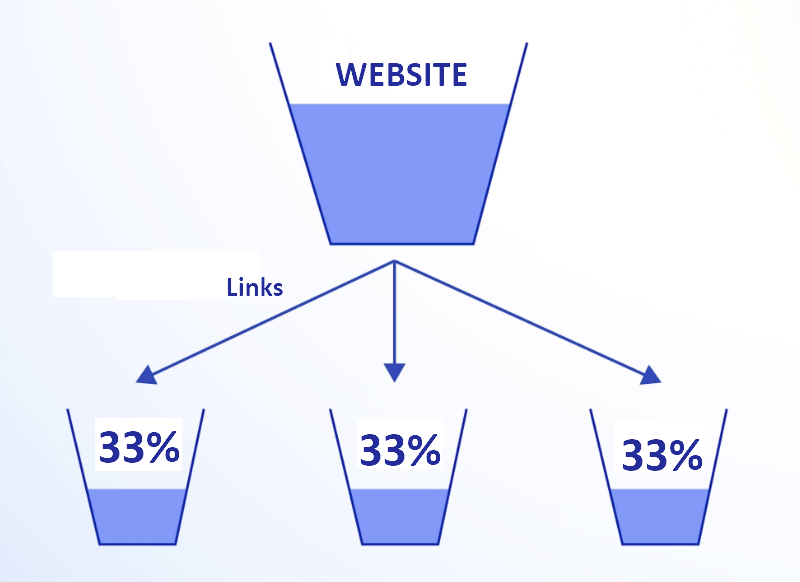
When a webpage links to another, it passes a portion of its PageRank (a Google algorithm that measures a page’s importance) to the linked page. This flow of link juice helps search engine crawlers understand the relationship between webpages and the overall structure of a website.
How Does Link Juice Affect Rankings?
Pages with more link juice are seen as more authoritative and relevant by search engines, leading to higher rankings in SERPs. This increased visibility can drive more organic traffic and potential customers to a SaaS website.
Factors That Affect Link Juice
Several elements impact the amount and quality of link juice a webpage receives:
- Domain Authority: Links from websites with high domain authority (DA) pass more link juice than those from low-DA sites.
- The Linking Page’s Authority: Links from authoritative, high-PageRank pages within a domain carry more weight than those from low-authority pages.
- Link Relevancy: Links from webpages with content relevant to the linked page pass more link juice and are seen as more valuable by search engines.
- Number of Links on a Page: The more links on a webpage, the less link juice each link passes, as the PageRank is divided among all outbound links.
- Nofollow Links: Nofollow links do not pass link juice, but they can still drive referral traffic and contribute to a natural backlink profile.
- The Link’s Location in Page: Links placed in the main content area of a webpage carry more weight than those in the footer or sidebar.
- 404 Errors: Broken links leading to 404 error pages do not pass link juice and can negatively impact a website’s SEO.
- Duplicate Content: Pages with duplicate content may not pass as much link juice as unique, high-quality content.
- Disavow: Disavowing spammy or low-quality links can help maintain a healthy backlink profile and ensure link juice is passed from reputable sources.
The Impact of Link Juice On SaaS Businesses
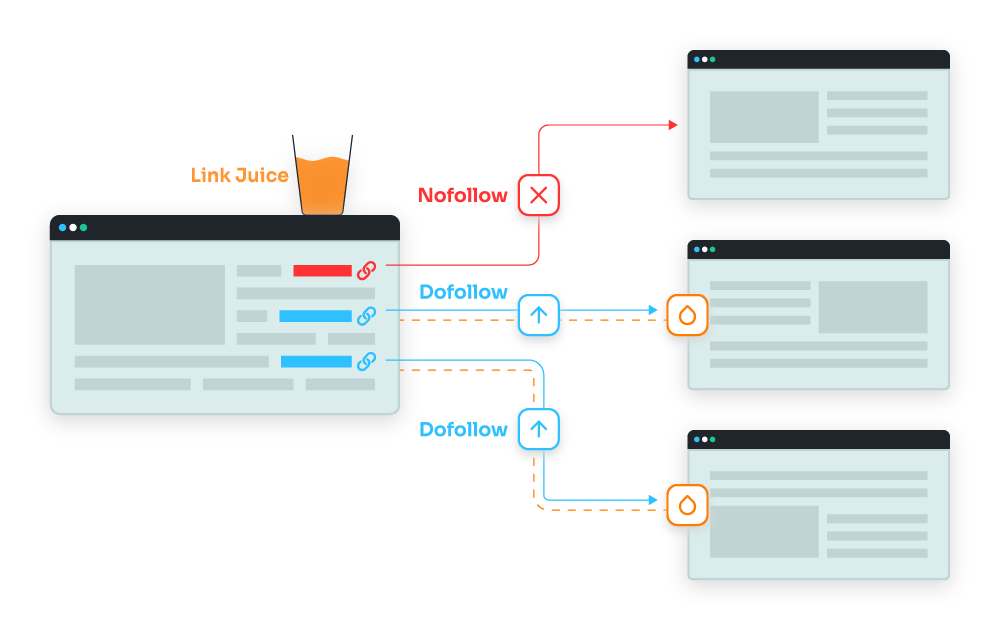
For SaaS companies, maximizing link juice can lead to higher search engine rankings, increased organic traffic, and more potential customers discovering their products or services.
Focusing on building high-quality, relevant backlinks can help SaaS businesses improve their online visibility and drive sustainable growth.
Can You Check Link Juice?
While there’s no direct way to measure link juice, SEO tools like Ahrefs, Moz, and SEMrush provide metrics that can help estimate a webpage’s authority and the value of its backlinks. These include Domain Rating (DR), Page Authority (PA), and URL Rating (UR).
How Pages Get More Link Juice?
Pages can acquire more link juice by earning high-quality backlinks from authoritative websites, optimizing internal linking structures, and creating valuable, linkable content that naturally attracts links.
How to Send Link Juice to a Page?
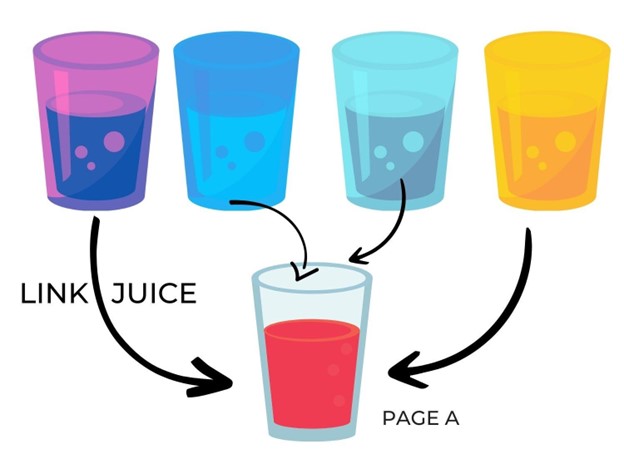
There are several strategies to direct link juice to a specific webpage:
- Build External Links: Earn backlinks from high-authority, relevant websites through tactics like guest posting, broken link building, and creating linkable assets.
- Niche Edits: Identify existing articles in your niche and reach out to the website owners to add your link, passing link juice to your page.
- Guest Posts: Contribute high-quality guest posts to reputable websites in your industry, including a link back to your target page.
- Linkable Assets: Create valuable content like infographics, research reports, or tools that naturally attract links from other websites.
- Build Internal Links: Strategically link from high-authority pages on your website to the target page, using relevant anchor text.
How to Get More Link Juice For Your Pages?
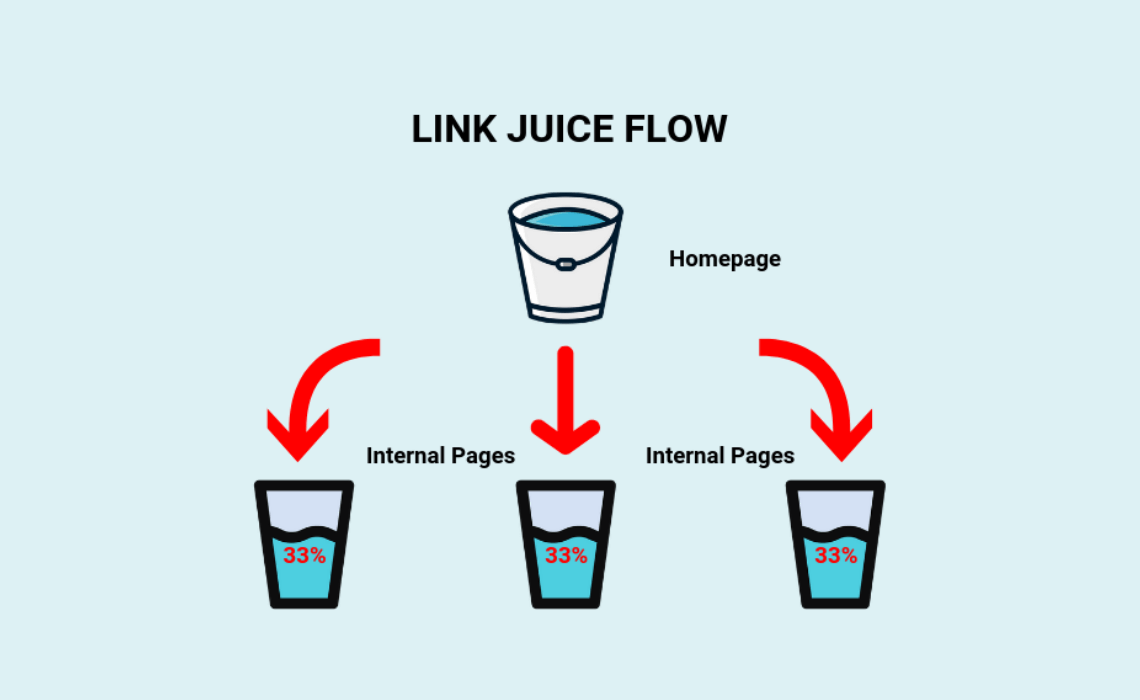
To increase the link juice flowing to your webpages, consider these tactics:
- hreflang For International Websites: Use hreflang tags to ensure search engines understand the relationship between multilingual versions of your content, consolidating link juice.
- Link Reclamation: Monitor your brand mentions and reach out to websites that mention your brand without linking, requesting them to add a link.
- Linkbait Content: The Skyscraper Technique: Create content that significantly improves upon existing top-ranking articles, then reach out to websites linking to the original piece and ask them to link to your superior content instead.
- Outreach: Identify websites in your niche that may be interested in linking to your content, and reach out to them with a compelling value proposition.
How to Leverage Link Juice to Improve SEO?
To harness the power of link juice for SEO, focus on these key areas:
- Obtain Links From External Domains: Earn high-quality backlinks from authoritative websites in your industry to boost your domain’s overall link juice.
- Employ Internal Links: Optimize your website’s internal linking structure to efficiently distribute link juice among your most important pages.
- Utilize SEO Auditing Services: Regularly audit your website to identify and fix issues that may hinder the flow of link juice, such as broken links or duplicate content.
How to Maximize Your Link Juice?
To make the most of your website’s link juice, consider these strategies:
- Multiplying the Sources of Referral Juice: Diversify your backlink profile by earning links from a variety of high-quality, relevant websites.
- Transmission of Link Juice: Ensure your internal linking structure efficiently passes link juice from high-authority pages to important content.
- Conducting a Netlinking Campaign: Develop a targeted link building campaign to acquire high-value backlinks that will boost your website’s overall link juice.
- Using Guest Blogging: Contribute guest posts to reputable websites in your industry, including links back to your most important pages.
How to Avoid Losing Link Juice?
To prevent link juice from being wasted, avoid common pitfalls like broken links, 404 errors, and excessive use of nofollow links. Regularly monitor your website’s backlink profile and disavow any spammy or low-quality links that could harm your SEO.
Ways to Optimize Link Juice For SaaS
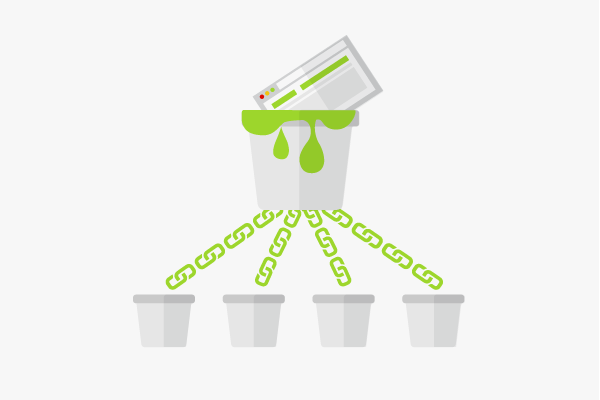
SaaS businesses can optimize their link juice by:
- Focusing on earning backlinks from authoritative websites in the SaaS and technology niches.
- Creating valuable, industry-specific content that naturally attracts links from relevant websites.
- Optimizing internal linking structures to prioritize key product and feature pages.
- Leveraging social media and content marketing to amplify link building efforts and drive referral traffic.
Is Link Juice the Same as PageRank?
While link juice and PageRank are closely related, they are not the same. PageRank is a specific algorithm used by Google to measure a webpage’s importance based on the quality and quantity of its inbound links. Link juice, on the other hand, is a more general term referring to the authority and value passed between webpages through links.
How to Discover a Site’s PageRank?
Google no longer publicly reveals PageRank scores, but SEO tools like Ahrefs and Moz provide alternative metrics (Domain Rating and Domain Authority, respectively) that estimate a website’s overall authority based on its backlink profile.
Link Juice Vs. PageRank
While people often mix them up, it’s important to know the difference between “link juice” and “PageRank” for a good SEO strategy. Link juice is a general term. It means the value that flows from one web page to another through links.
PageRank is a name created by Google. It refers to a specific algorithm that measures how important a web page is, based on the quantity and quality of its links. Google does not update PageRank anymore, so it’s now an old measure.
Is Link Juice Still Going To Matter In 2024 And Beyond?
Yes, link juice will likely remain an important factor in SEO for the foreseeable future. As long as search engines rely on links to discover, crawl, and rank webpages, the concept of link juice will continue to play a significant role in determining a website’s visibility and success in organic search results.
FAQ’s:
What is Link Juice in SEO?
Link juice refers to the value and authority passed from one webpage to another through hyperlinks, influencing the linked page’s ranking in search engine results.
Do Nofollow Links Pass Link Juice?
No, nofollow links do not pass link juice, but they can still drive referral traffic and contribute to a natural backlink profile.
Can Internal Links Pass Link Juice?
Yes, internal links can pass link juice between pages on the same website, helping to distribute authority and improve the overall SEO of the site.
How Does Link Juice Affect My Website’s Ranking?
Pages with more link juice are seen as more authoritative and relevant by search engines, leading to higher rankings in search results and increased organic traffic.
Can All Types of Links Generate Link Juice?
Only dofollow links pass link juice; nofollow, sponsored, and UGC links do not. However, a natural mix of link types is important for a healthy backlink profile.
Is it Better to Have More Links or Higher-Quality Links?
Higher-quality links from authoritative, relevant websites are generally more valuable than a large quantity of low-quality links. Focus on earning links from reputable sources in your industry.
How Can I Improve the Link Juice My Website Receives?
To improve your website’s link juice, focus on creating high-quality, linkable content, building relationships with other websites in your niche, and optimizing your internal linking structure to efficiently distribute authority among your pages.
Conclusion
Link juice is a vital concept in SEO that significantly impacts a website’s ranking and visibility in search engine results.
For SaaS businesses, understanding and optimizing link juice can lead to increased organic traffic, higher conversions, and sustainable growth.
Focusing on earning high-quality backlinks, creating valuable content, and strategically distributing link equity through internal linking can help SaaS companies maximize their link juice and achieve long-term SEO success.

